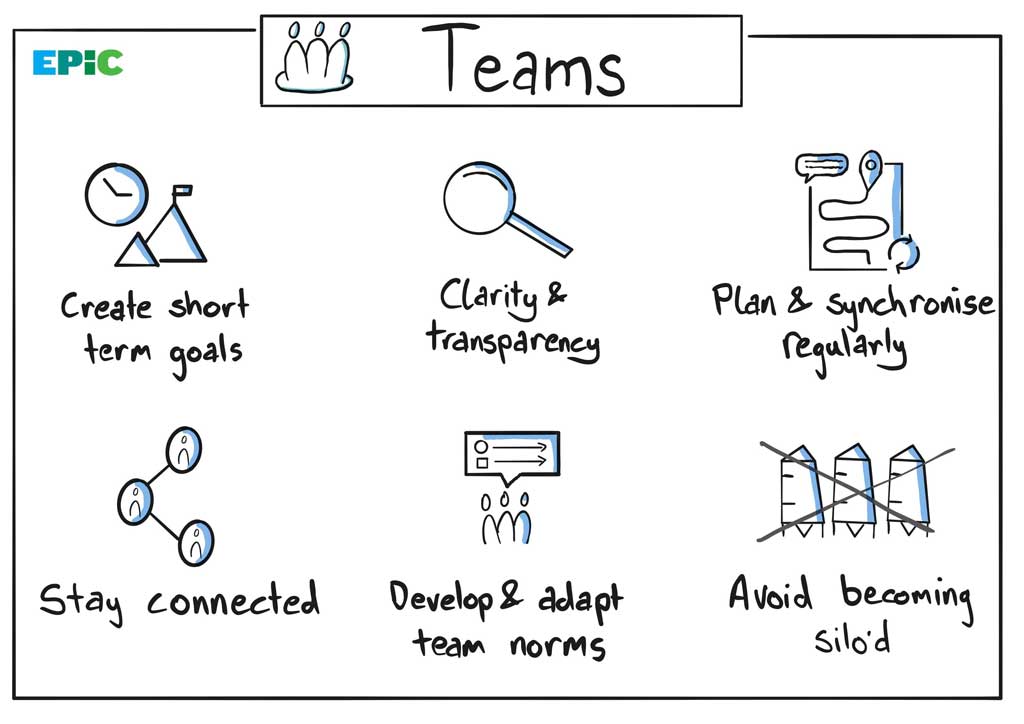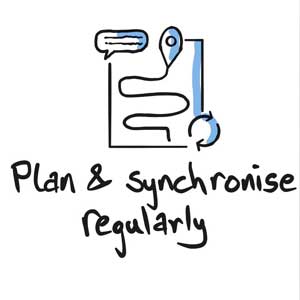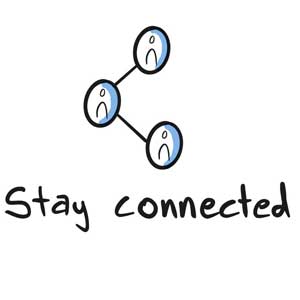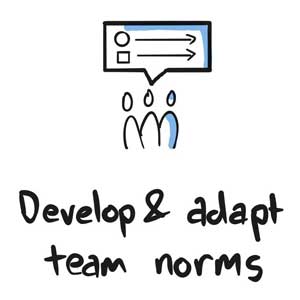 Back to Resources
Back to Resources
Teams that have been thrown into this remote working situation are quite frankly going to need direction and compassion from their leaders, and a genuine feeling of comradery and a boost of support from each other. It is no longer possible to just make do with fickle tooling while also likely missing out on key points of conversations when working from home intermittently.
For the foreseeable future you will not be working together in person. And this is a massive adjustment on many levels for any team! To help teams moving into this new remote environment we have six key elements to focus on as the first steps.
Read the other layers of the Sur-Thrival Guide:
1. Create Short-term Goals
Now that many people are no longer in an environment where they regularly engage with colleagues, they might find themselves slipping into bad habits, such as putting off or delaying tasks. Tasks that they usually perform in a collegiate work atmosphere, under an office discipline they are used to. Introducing goals set over a shorter period of time, can help the team with their focus and make their workload feel more achievable.
When creating short term team goals, consider how they connect to the larger business goal or vision, and then work together as a team to chunk work down into attainable components that deliver outcomes. Having that shared understanding and going through the creation process together, will assist in building a sense of team accountability.
As the team creates short term goals, ask questions to understand who it’s for, why they want it, and what value it will provide. A good rule to follow when creating any goal is to make them SMART goals.
2. Clarity & Transparency
When teams have a good grasp on what they are doing and why, it allows for deeper conversations and connections, and the ability to make informed decisions. If the clarity and transparency around purpose is not evident, it is likely to become an even greater area for concern with teams working 100% remotely.
Teams need to receive encouragement and positive support to recognise they are in a safe environment to ask fundamental questions, and clarify any areas of concern. Developing a culture where teams clearly understand each other’s roles and responsibilities, their workload, and how it all fits into the greater organisation is hugely vital to making sure the team has the visibility to focus on the right goals and contribute effectively.
Online tools such as Atlassian products Jira and Confluence, and visual boards like Trello are designed for virtual collaboration and visibility. They will not only be beneficial for teams, though also for sharing and collaborating with stakeholders and others outside the team.
3. Plan & Synchronise Regularly
Teams are now experiencing a fast and dramatic shift in how they work together. Planning and coordinating how and when their teamwork will be achieved will play a considerable part in team members feeling involved, connected and invested at this uncertain time. Establish a regular session to look at what the work is, and empower all team members to play a part in the decision-making process on how it will be accomplished.
As nonverbal cues fundamental to our communication such as body language and hand gestures are not as reliable over video conference as they are in person, clear concise language for communication becomes invaluable. At first over-communicating is recommended, as everyone familiarises themselves with this way of working. Syncing regularly on priorities and goals will help keep the team informed and connected. Using this simple technique below is a great way for teams to share what’s going on:
- What have we done since we last met to move us towards our goals?
- What are we doing next to keep us moving towards our goals?
- Is there anything stopping us from completing our goal, and what help do we need?
Slack and MS Teams are tools that can be used for quick touchpoints through the day to connect within teams and also with others in the organisation.
4. Stay Connected
Regular connection cannot be emphasised enough as it provides consistency to teams who may be experiencing disruption in many areas of their lives. Coming together at the same time each day, or at a regular point a couple of times a week establishes a team rhythm, and the opportunity to strengthen the team bond. This time together can be used to discuss work progress, share business information or build-out work priorities, or share something personal like perhaps something funny that happened in their household that day.
Without the opportunity to stop by someone’s desk, or talk to the person next to you, we are missing out on vital social interaction. It can be easy to just keep working when in your home environment. Be conscious of this and make the effort to connect with people. Scheduling a virtual coffee with a colleague is a great way to make sure you not only take a break but also have the opportunity to chat about non-work related subjects.
Setting up team traditions, like celebrating birthdays by posting birthday messages or memes on your team chat, or having end-of-week virtual drinks adds to the essence of connecting on a more relatable level within the team.
5. Develop & Adapt Team Norms
Now that people are being thrust into new working conditions, tensions within a team may start to run high. Using a working agreement encourages team commitment, responsibility and accountability. It’s the opportunity to get things out in the open, and to understand everyone’s expectations on working together, rather than leaving it to untested assumptions.
Having the team spend time defining their own Team Agreement, also called a Social Contract, allows them to consider what they value and need from each other to have a healthy team culture and be successful as a team. It gives everyone a voice, and can draw appreciation for what one another may be juggling at this particular point in time. If one already exists, consider what the team may want to add or remove now that they are working under different circumstances.
Create this agreement by bringing the team together for a facilitated conversation to talk about the attributes and behaviours that you value and agree to demonstrate as a team. This could include broader statements such as ‘trust each other’s abilities’, and more practical and actionable points like ‘turn your camera on for meetings’. Make sure to include fun things like ‘share what you did on the weekend each Monday’. Your team’s working agreement should not be a ‘set and forget’ exercise. Keep this present in your team interactions, and keep yourself and one another accountable. Review it as needed and amend it to suit the current team structure.
6. Avoid Becoming Silo’d
Leaders are typically confident in their ability to make decisions and act rapidly to new information. In this time of ultimate flux, having a plan, being decisive and acting with deliberateness, will be pivotal in leading with integrity and courage. Take into consideration that there will be many people that are feeling vulnerable, and unsure of what is expected of them. Show humility and compassion, and be clear in all your communications. As findings and decisions are made, or priorities shift, be swift in sharing this clearly and articulately with your people.
Reach Out
We hope these 6 elements for Teams have helped but if you would like further assistance, we’d love to help! This is what we do as Business Agility coaches and we are here to help in these situations. If you have any questions or would like help to facilitate these sessions and conversations, reach out to us here: Contact Us












